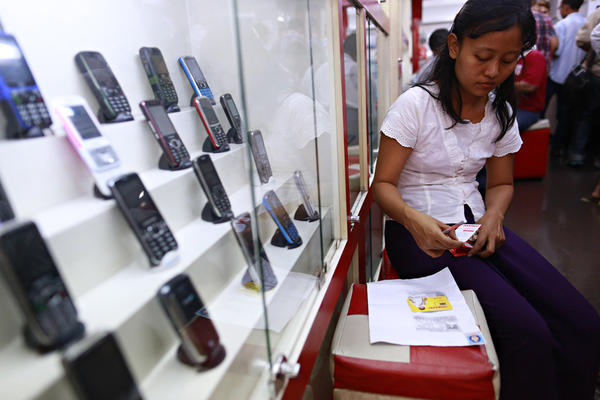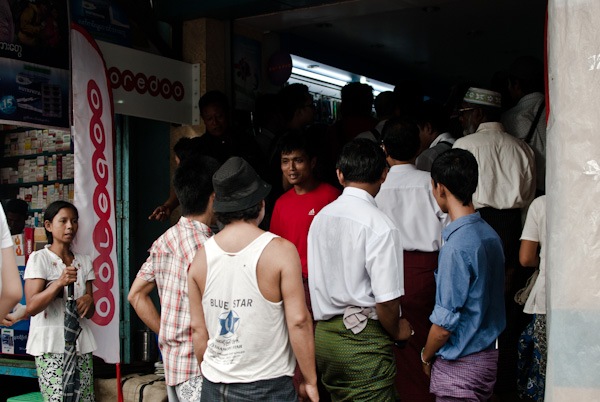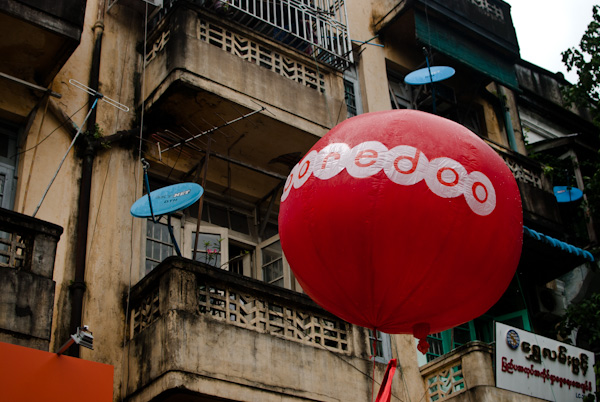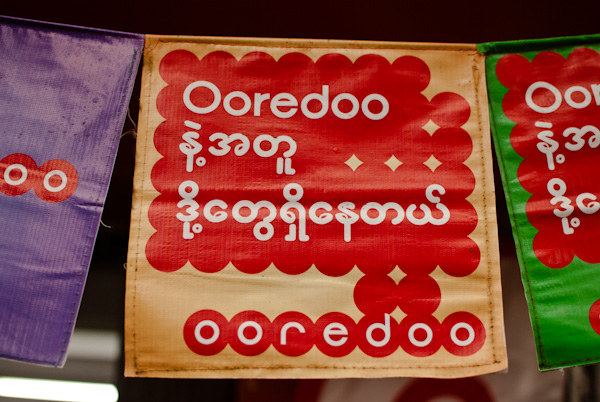Inexpensive calls and data are coming to Myanmar after years of junta-era restrictions. But some worry that the new Internet and phone access could fuel strife between Muslims and Buddhists.
Talk is often cheap. But that hasn’t been the case in Myanmar – until now.
The insular military junta that ruled until 2011 tightly restricted communications. Internet access was sluggish and expensive. Mobile SIM cards cost north of $1,000, limiting their use to a tiny slice of the population.
But inexpensive calls and data are finally coming to Myanmar (Burma). On Thursday, the Qatar-based Ooredoo company officially launched a new national cellphone network, becoming the first foreign firm to operate in the previously closed telecommunications sector.
After years of tight control, local response has been enthusiastic. Cellphone shops in the crumbling commercial capital of Yangon were deluged with customers when the first Ooredoo SIM cards went on sale last month. Priced at 1,500 kyats ($1.60), SIMs were in such demand that they were soon being sold on the black market for up to five times their face value.
Ooredoo’s launch, which will be followed next month by that of Norwegian competitor Telenor, is set to trigger a connectivity boom here. Cellphone penetration is expected to rise to 80 percent by 2015, up from around 27 percent currently, bringing cheap calls and Internet access to even remote areas.
But the era of cheap calls and 3G data could be a mixed blessing for Myanmar, a country of 52 million that has recently opened to the world after decades of isolation. As the country has initiated political reforms and welcomed foreign investment, freedom has presented a dark side: a sharp rise in rumor-mongering, hate speech, and misinformation focusing on its Muslim minority.
“Information (and misinformation) about a religious incident in one state can rapidly spread to another, almost in real time,” says Aela Callan, a Knight Fellow from Stanford University who is researching hate speech in Myanmar. But, she says, if the amplifying effects of a data boom are not addressed now, “the consequences could be very serious indeed.”
In July, anti-Muslim riots erupted in Mandalay, Myanmar’s second city, triggered by blogs and Facebook posts claiming a Muslim man had raped a Buddhist woman. Social media postings by anti-Muslim extremist groups have also fanned the flames in western Rakhine State, which has been roiled by violence between Buddhists and Muslims since late 2012.
In a tense climate, it might only take “one irresponsible news story and a few thousand mouse clicks on Facebook to set Mandalay or any other major city ablaze,” wrote Burmese-American author Kenneth Wong after the Mandalay riot.
Rumor and conspiracy are nothing new in Myanmar, where decades of military dictatorship have instilled a deep distrust of official information. But in a digital age, rumors and misinformation can go viral. Internet penetration rates remain low in Myanmar, with just over a million Facebook users, and Ms. Callan says most hate speech still happens offline. But the coming data boom could have massive amplifying effects.
In the wake of the Mandalay riots, authorities blocked access to Facebook, with police chief Win Kaung claiming it was necessary to “stop the instigation” of violence. But the solution to rumor and falsehood may well be more speech, not less.“Facebook is not the main cause.… If you close Facebook, [extremists] will just use other ways,” says Nay Phone Latt, a blogger and executive director of the Myanmar ICT for Development Organization (MIDO).
In April, MIDO and other civil society groups launched the “Panzagar” campaign. Meaning “flower speech” in Burmese, the campaign challenges people to think about the consequences of their online activities by putting flowers in their mouths and posting photos of themselves to Panzagar’s Facebook site.
Mr. Latt says that the campaign is just one step in the slow process of educating people about how to ensure Myanmar’s coming Web revolution fosters a more informed society. “The Internet is just a tool,” he says. “The good guy can use [it], but the bad guy also can.”
Published by the Christian Science Monitor, August 15, 2014







